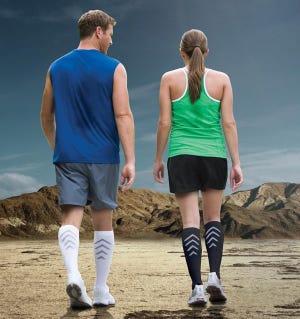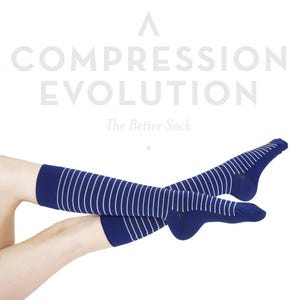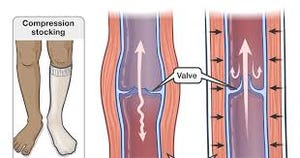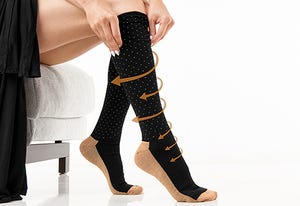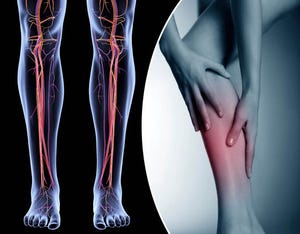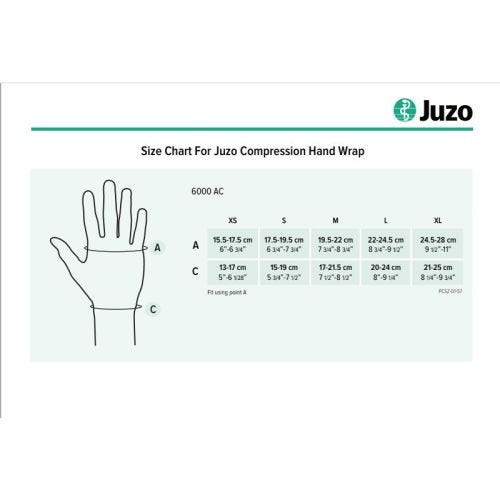Discount Surgical Air Travel Compression Socks Keep Legs Comfortable
Doctors often talk about the benefits of compression socks for air travel in life or death terms.
Dr. Doug Tumen, who practices podiatry in Kingston, New York notes that “The answer to the question ‘Are compression socks necessary for air travel?’ is an unqualified yes, especially for flights of more than four hours.” Dr. Tumen says that compression socks prevent swelling in the feet and legs, and, more importantly from a medical perspective, lower the risk of a dangerous blood clot called a DVT, or deep vein thrombosis.
A DVT is a fragment of a blood clot that can break off and travel to the lungs. This piece of a blood clot becomes a pulmonary embolus that can be fatal without warning.
There are people for whom the benefits of compression socks for air travel include arriving at your destination alive. About one person in 20 develops a DVT at some point in life.
The risk of DVT is higher in men than in women, and higher in both whites and African Americans than in people of Asian or Hispanic descent. Women on versions of the Pill that are high in estrogen are at added risk for DVTs, as are women who take estrogen replacement therapy. Men who have had a heart attack or pulmonary embolism are also at greater risk of DVT. If you develop a DVT after the age of 60, and have to be hospitalized, there is about a 20 percent chance you won’t survive.
If you have been on a long flight and your legs are swollen, and maybe they hurt, they are tender to the touch, the skin on your legs is red or warm, or you can feel something like a cord running up and down your leg, see a doctor right away, even if you are in a foreign location. Over 300,000 people in the US alone die of DVTs every year. Better, lower your risk of DVT by wearing compression socks!
But preventing DVTs is not the only reason to wear compression socks when you travel by plane.
Flight compression socks for travel are a fashion choice.
Legs can look puffy after flying. It can take up to a week for the puffiness to go away. When you wear compression socks for air travel, your legs might not swell up at all.
Writer, journalist, producer, and host for Style Out There at Refinery29 Connie Wang says that when she used to travel internationally for fashion shows, she would pack a lot of loose pants. “I would wear trousers with a looser fit to disguise the ‘thunder calves’ I would get from longer flights. But when she started wearing compression tights on her flights, she started being able to step off the plane and into skirts.
Compression socks have dowdy origins, but they definitely aren’t something that only Grandma wears any more. Compression socks and compression tights are available in a variety of chic casual designs that go with any travel outfit.
What about compression socks for air travel for men?
The reasons men should wear compression socks aren’t limited to preventing deep vein thrombosis. Nerdy knee-high compression socks improve athletic performance at travel destinations (in both men and women). A study of elite athletes who flew from Canberra, Australia to
Manila in the Philippines for a tournament found that wearing compression socks on the flight:
- Reduced jet lag.
- Improved bloodstream oxygen levels during the flight and for 9 hours after landing.
- Lowered pulse rate.
- Improved ability to jump.
- Increased running speed.
- Improved coordination.
- Lowered systolic blood pressure (the first number).
- Reduced calf circumference, showing that wearing compression socks reduced swelling of the legs.
These benefits of wearing compression socks were all in healthy athletes who would not be expected to have DVTs. And every competitive athlete knows the value of even small improvements in fitness for winning a game or a race.
What if you don’t care if you have beautiful legs and you aren’t a competitive athlete? Do you need to wear compression socks on the plane?
If you are pregnant, the answer is in the affirmative. Pregnancy compression socks for air travel can keep mothers-to-be a lot more comfortable on the plane and a lot more mobile when they get off the plane. Pregnancy is also a risk factor for DVTs, and compression socks protect both mother and unborn on flights that take more than four hours.
Many travelers report that wearing compression socks or compression tights just makes them feel better when they arrive at their destination. Kate Davidson Hudson, co-founder of the ecommerce accessory site Editorialist, says “My legs have always felt better when I take compression socks off than when I put them on. Now that compression socks come in so many designs and colors that they can do double duty as a fashion accessory, you just can’t go wrong wearing them.”
Now let’s consider some frequently asked questions about compression socks.
Q. Are there any people who should not wear compression socks?
A. If you have broken or oozing skin, you should not wear any kind of tight fitting garment until your skin heals. You should avoid compression socks if you have a diabetic foot infection or cellulitis.
Q. How do compression socks work?
A. Compression socks provide graduated pressure to help blood flow upward through the veins of your legs against the force of gravity. Compression socks are woven with elastic so that they exert the greatest amount of pressure at your ankles and less pressure on your calves (and still less pressure on your thighs if you wear compression tights). The pressure on your skin narrows veins and increases blood pressure so blood flows upward.
Q. I have a lot of trouble putting my compression socks on. Is there are an easy to put on compression socks?
A. One way to put on compression socks is to use a donning frame. This is a metal frame over which you roll the socks so you can roll them back over your feet so you can pull them up your leg.
Another way to put on compression socks is to reach inside the compression sock with your hand and roll it inside out. Place your foot at the toe of the sock and roll it back up your foot and leg so the outside of the sock is again facing out.
Putting on compression socks and compression tights shouldn’t be a struggle. If you are getting a workout pulling your socks above your ankle, chances are that you don’t have the heel of the sock lined up with you own heel. Start over, making sure that you are not trying to put on the sock upside down.
Don’t feel bad if it takes you several attempts to don your compression socks the first few times you wear them. But allow yourself extra time to get dressed on the day of your flight if you haven’t already practiced.
Q. What are the different kinds of compression socks?
A. Compression socks come in different lengths. For air travel wear, most compression socks go to just below the knee, but you can also get thigh-highs and tights.
Compression socks also come in different pressures, measured in mm/Hg, the same units used for measuring blood pressure. If you aren’t wearing prescription compression socks, the rule of thumb is that compression garments should feel snug, they shouldn’t be painfully tight. There are compression socks with pressure as low as 10 mm/Hg for athletic wear and flight compression socks for air travel. Compression socks and stockings for preventing DVT may have a pressure of about 40 mm/Hg. When your doctor prescribes thrombo-embolic deterrent hose, of anti-embolism stockings, the right pressure will be specified.
Q. Do I have to take compression socks or tights off as soon as I get off the plane?
A. No! Many people use compression socks as everyday wear to prevent swelling in the legs while sitting at a desk and to improve athletic performance in games and competition. Compression socks may give you a slight edge on the playing field by improving balance and reducing muscle fatigue. The difference in athletics is small, but measurable. But no matter why you usually wear compression socks, try out a pair before your trip. Compression socks for long air travel have to be comfortable.wander
Q. What are the best compression socks for air travel?
A. We recommend Discount Surgical for air travel compression socks. Check out our selection on Discount Surgical.



